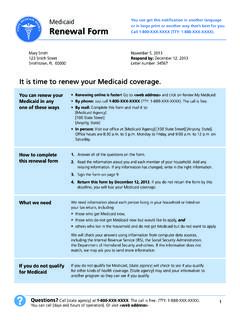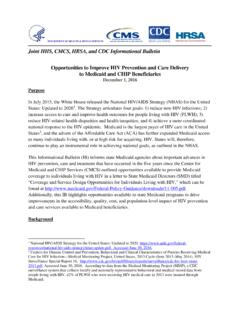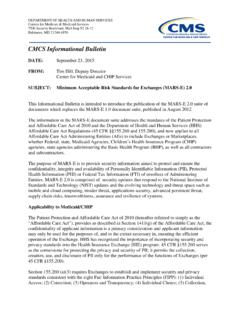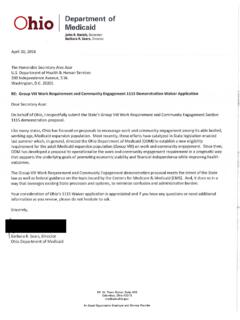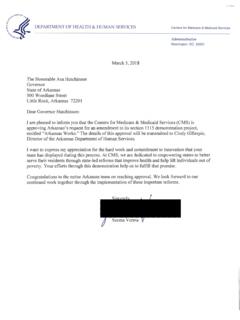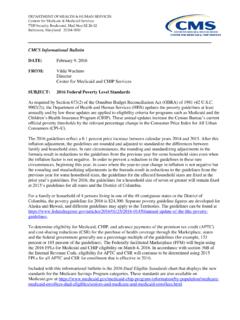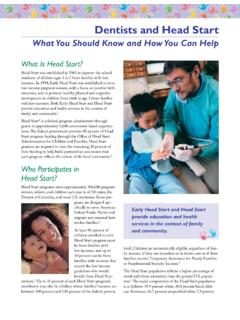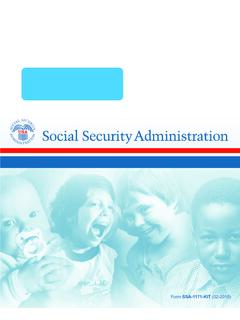Transcription of DEPARTMENT OF HEALTH & HUMAN SERVICES ... - …
1 DEPARTMENT OF HEALTH & HUMAN SERVICES Centers for Medicare & medicaid SERVICES 7500 Security Boulevard, Mail Stop S2-26-12 Baltimore, Maryland 21244-1850 SMD # 18--011 RE: Opportunities to Design Innovative Service Delivery Systems for Adults wit h a Serious Mental Illness or children with a Serious Emotional Disturbance November 13, 2018 Dear State medicaid Director: The purpose of this letter is to announce opportunities to design innovative service delivery systems, including systems for providing community-based SERVICES , for adults with a serious mental illness (SMI) or children with a serious emotional disturbance (SED) who are receiving medical assistance, as mandated by section 12003 of the 21st Century Cures Act (Cures Act).
2 I Section 12003 of the Cures Act also mandated that this State medicaid Director (SMD) letter include opportunities for demonstration projects under section 1115(a) of the Social Security Act (the Act) to improve care for adults with SMI or children with SED (referred to throughout this SMD letter as this SMI/SED demonstration opportunity ). Improving care for beneficiaries with SMI or SED is a top priority for the Centers for Medicare & medicaid SERVICES (CMS). With this SMD letter, CMS hopes to enhance our work with states to improve care for medicaid beneficiaries with serious mental HEALTH conditions.
3 This SMD letter is comprised of the following two parts: under Existing Authorities to Support Innovative Service Delivery Systemsfor Adults with SMI and children with SED; Demonstration The Substance Abuse and Mental HEALTH SERVICES Administration (SAMHSA) has defined adults with a serious mental illness as persons, age 18 and over, who currently, or at any time during the past year, have had a diagnosable mental, behavioral, or emotional disorder of sufficient duration to meet diagnostic criteria, that has resulted in functional impairment which substantially interferes with or limits one or more major life Major life activities include activities of daily living ( , eating, bathing, dressing)
4 , instrumental activities of daily living ( , maintaining a household, managing money, getting around the community, taking prescribed medication), and functioning in social, family, and vocational/educational An estimated million adults in the United States had an SMI during the past year in 2016, but only 65 percent received mental HEALTH SERVICES in that year (and this rate of treatment remained about the same between 2008 and 2015).iv Page 2 State medicaid Director SAMHSA has defined children with a serious emotional disturbance as persons from birth up to age 18, who currently, or at any time during the past year, have had a diagnosable mental, behavioral, or emotional disorder of sufficient duration to meet diagnostic criteria that resulted in functional impairment which substantially interferes with or limits the child s role or functioning in family, school.
5 Or community Functional impairment is defined as difficulties that substantially interfere with or limit a child or adolescent from achieving or maintaining one or more developmentally-appropriate social, behavioral, cognitive, communicative, or adaptive Mental HEALTH disorders usually first arise in childhood, adolescence, or early adulthood with 50% of people with mental HEALTH conditions having experienced those conditions by age 14 and 75% by age Approximately 13% 20% of children and adolescents living in the United States experience a mental disorder in a given yearviii and nearly half of children under age 21 who qualify for medicaid based on a disability have a behavioral HEALTH Rates of unmet need for treatment are high among children and adolescents.
6 Only about half of all children with emotional or behavioral difficulties receive mental HEALTH SERVICES ,x and only 41 percent of the million adolescents who experienced depression over the past year in 2016 received Serious mental HEALTH conditions can have detrimental impacts on the lives of individuals with SMI or SED and their families and caregivers. Since these conditions often arise in adolescence or early adulthood, individuals with SMI or SED are less likely to finish high school and attain higher education, disrupting education and employment Prior research has found a gap of ten years or more between the first onset of symptoms and initiation of Adults with SMI comprise about half of the individuals under 65 who are dually eligible for both Medicare and medicaid , and those with SMI are the costliest subgroup among these younger dual Furthermore.
7 Adults who are incarcerated and homeless have high rates of Individuals with SMI often have co-morbid physical HEALTH conditions and substance use disorders (SUDs),xvi and they die on average 8 years younger than the general Suicide, which can be associated with mental HEALTH disorders, has been increasing in nearly every state, with increases of over 30% in over half of the states since I. Strategies under Existing Authorities to Support Innovative Service Delivery Systems for Adults with SMI and children with SED Earlier Identification and Engagement in Treatment Critical strategies for improving care for individuals with SMI or SED include earlier identification of serious mental HEALTH conditions and focused efforts to engage individuals with these conditions in treatment sooner.
8 As highlighted in another recent CMS SMD Some approaches discussed below for encouraging earlier identification of and engagement in treatment for serious mental HEALTH conditions include support for development of referral networks to mental HEALTH providers including through improved connections and data-sharing capabilities linking non-specialized HEALTH care settings and community organizations with mental HEALTH providers. Another approach to support earlier identification and engagement in treatment is support for increased screening for mental HEALTH conditions and improved access to mental HEALTH SERVICES through schools.
9 Page 3 State medicaid Director One reason that earlier identification and engagement in treatment is critically important is that recent research studies have found that a dolescents and young adults with psychosis can have significantly elevated risks of mortality in the first year after One study pointed to a significantly elevated risk of suicide in particular during the first year after a diagnosis of psychosis as well as following a first recorded diagnosis of major Both studies concluded that these findings point to the importance of assertive outreach and engagement as soon as possible after an adolescent or young adult is first diagnosed with a serious mental HEALTH condition.
10 As highlighted in an informational bulletin jointly issued by CMS, SAMHSA, and the National Institute of Mental HEALTH , the Coordinated Specialty Care Model is an evidence-based model of care designed to help identify and engage adolescents and adults with SMI, specifically psychosis, as soon as possible in treatment with specialized mental HEALTH providers, , community mental HEALTH This model takes a multidisciplinary, team-based approach to providing comprehensive SERVICES as soon as possible after a person first experiences psychosis. The package of SERVICES in this model includes outreach by providers to cultivate referral networks and engage with patients, families, and caregivers as early as possible, coordination of SERVICES among treatment team members, clinical supervision, medication and medication management, psychotherapy, case management, coordination with primary care, family/caregiver support and education, and supported employment and supported education.
